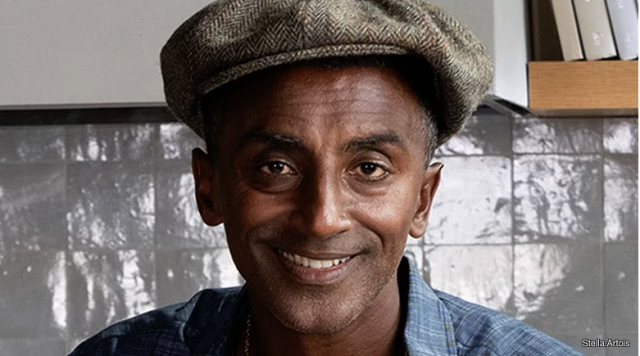 The Ethiopian-born and Swedish-raised chef says the concept of American cuisine focused almost entirely on European dishes for a "long time." But that's never been the whole story. The chef said, "We know as a diverse, layered nation that there's been a huge contribution by African-Americans to the American food experience." (Mashed)
The Ethiopian-born and Swedish-raised chef says the concept of American cuisine focused almost entirely on European dishes for a "long time." But that's never been the whole story. The chef said, "We know as a diverse, layered nation that there's been a huge contribution by African-Americans to the American food experience." (Mashed)
Chef Marcus Samuelsson celebrates a wide array of culinary traditions that comprise what we call American cuisine. Fortunately for us, that means American cuisine is more than just burgers and apple pie. The judge of “Chopped” and host of the culinary travel show “No Passport Required” is known for touring the country to explore how immigrant communities have influenced and helped create the cuisine we know and love (via PBS). We asked the restaurateur and cookbook author during an exclusive interview with Mashed to debunk myths about American cuisine.
Samuelsson explained the concept of American cuisine focused almost entirely on European dishes for a “long time.” But that’s never been the whole story. The chef said, “We know as a diverse, layered nation that there’s been a huge contribution by African-Americans to the American food experience.” Chefs like Samuelsson know innovation is key to the foundation of American cuisine because as he said, “There’s always a blend between immigrants and their traditions and indigenous people adding on and adding on.” Food must evolve because “as generations we evolve,” he furthered.
In his shows, restaurants, and cookbooks, Samuelsson explores “about four cuisines in America” that are a direct link to the African-American experience. American food is a modern umbrella term, which the Red Rooster owner said brings all these heritage flavors together “whether it’s barbecue, Southern food, Lowcountry, and Korean cooking.” The major influence of African-American techniques, ingredients, and flavors are the elements that the Season 2 “Top Chef Masters” winner wanted to highlight in his most recent cookbook, “The Rise: Black Cooks and the Soul of American Food” (via Eater). Samuelsson learned cooking is more than following a recipe. “I don’t think my grandmother ever shared a pure recipe with me,” Samuelsson said. “Well, ritual has been around much longer than just traditional recipes … it’s also very much word of mouth.” The chef isn’t alone, Eater reports “no-recipe recipes” are making a big comeback.
The Ethiopian-born and Swedish-raised chef said “every time I cook, I think about my family,” and it should be no coincidence, “especially when it’s something Ethiopian or Swedish.” Samuelsson translates those rituals to his restaurants, but it can be found in the partners he works with in New York, Miami, Bermuda, Sweden, Canada, and elsewhere. ”Nurturing rituals is key and it’s kind of the core of what makes that extended family,” he said. “Whether it’s the cooks that you work with or the restaurants you go and support.” It’s no surprise Samuelsson is a leader in American cuisine, where consistent evolution that is nothing short of inspirational.
—
Join the conversation on Twitter and Facebook.

























